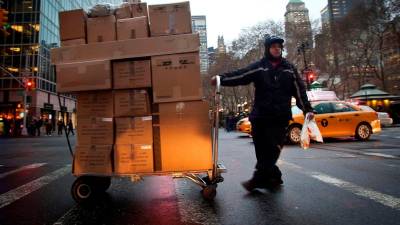WASHINGTON: The U.S. ended tariff exemptions for parcel imports on Friday without the logistical hiccups that dogged prior attempts, while consumers, e-commerce companies and small businesses using online marketplaces braced for cost increases and supply chain disruptions.
The U.S. Customs and Border Protection agency began collecting normal duty rates on all package shipments valued under $800, regardless of value, country of origin, or mode of transportation.
For the first six months, importers can opt to pay a flat-rate duty of $80 to $200 per package shipped from foreign postal agencies.
The change broadens the Trump administration’s cancellation of the de minimis exemption, already in place for packages from China and Hong Kong since May as part of an effort to halt shipments of fentanyl and its precursor chemicals into the U.S.
The customs agency’s commissioner, Rodney Scott, said it was ready to enforce the new duty requirements.
“For too long, this loophole handed criminal networks a free pass to flood America with fentanyl, fake goods, and illegal shipments. Those days are over.”
Trump administration officials said the change could boost U.S. customs revenues by $10 billion annually.
The de minimis exemption has been in place since 1938, starting at $5 for gift imports, and was raised from $200 to $800 in 2015 to foster small business growth on e-commerce marketplaces.
Direct shipments from China surged after President Donald Trump raised tariffs on Chinese goods during his first term, creating a new direct-to-consumer business model for e-commerce firms such as Shein and Temu.
The National Coalition of Textile Organizations hailed a “historic win” for U.S. manufacturing following the closing of a loophole that allowed foreign fast-fashion firms to avoid tariffs and import apparel sometimes made with forced labor, undercutting American jobs.
“The administration’s executive action closes this channel and delivers long overdue relief to the U.S. textile industry and its workers,“ the group said. The customs agency has estimated that the number of packages claiming the de minimis exemption jumped nearly 10-fold from 139 million in fiscal 2015 to 1.36 billion in fiscal 2024 – a rate of 4 million per day.
More than 25 foreign postal services suspended mail to the U.S. in the run-up to the de minimis deadline, helping the U.S. to avoid a repeat of the chaotic package pile-up that forced the Trump administration to pull back on its first attempt at ending the de minimis exemption for China in February.
“I’m not hearing of any huge slowdowns at any of the ports right now, but it’s still early,“ said Bernard Hart, vice president of customs and trade at logistics provider Flexport. “We do believe that industry had enough time to react to this and to move inventory around.”
The customs agency said 95% of all de minimis shipments are handled by general cargo carriers or express shippers such as FedEx, UPS and DHL, which had already adapted to the China changes. Britain’s Royal Mail resumed shipments on Thursday.
European postal groups including Germany’s DHL and Norway’s Posten Bring on Friday were seeking ways to handle the new fees and extra paperwork after suspending certain shipments.
Higher costs, more paperwork
Retail and trade analysts say the end of de minimis is likely to raise prices for many goods sold through e-commerce companies, as those that previously avoided tariffs because of the exemption become subject to duties. This may put such firms on a par with costs for more established retailers like Walmart that tend to import merchandise in bulk containers that are subject to tariffs.
It is also likely to curb trade on peer-to-peer platforms such as eBay and Etsy, which are used by small businesses to sell secondhand, vintage or handmade items.
The customs agency has collected more than $492 million in additional duties on packages shipped from China and Hong Kong since their exemptions were eliminated on May 2, another Trump administration official said.
Foreign postal agencies can opt to collect and process the duties based on the value of the package contents, or they can collect a flat tax calculated from the tariff rate in effect for the country of origin.
Based on the agency’s guidance issued on Thursday, parcels would be charged $80 from countries with Trump-imposed duty rates below 16%, such as Britain and the European Union; $160 from countries between 16% and 25%, such as Indonesia and Vietnam; and, $200 from countries above 25%, including Brazil, Canada, China and India – REUTERS
